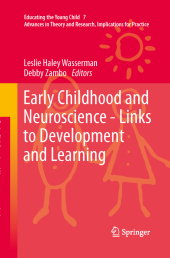 Neuerscheinungen 2015Stand: 2020-02-01 |
Schnellsuche
ISBN/Stichwort/Autor
|
Herderstraße 10
10625 Berlin
Tel.: 030 315 714 16
Fax 030 315 714 14
info@buchspektrum.de |

Leslie Haley Wasserman, Debby Zambo
(Beteiligte)
Early Childhood and Neuroscience - Links to Development and Learning
Herausgegeben von Wasserman, Leslie Haley; Zambo, Debby
Softcover reprint of the original 1st ed. 2013. 2015. xii, 220 S. 14 SW-Abb. 235 mm
Verlag/Jahr: SPRINGER NETHERLANDS; SPRINGER 2015
ISBN: 9400794568 (9400794568)
Neue ISBN: 978-9400794566 (9789400794566)
Preis und Lieferzeit: Bitte klicken
This volume provides a detailed understanding of how the brain develops, functions and learns. It shows how knowledge of the brain can help teachers educate young children and offers specific strategies and approaches drawn from neuroscience.
Information from neuroscience is growing and being properly used, and misused wich makes it imperative that educators receive accurate and practical information. This book provides the accurate and practical information educators (pre-service and in-service) and caregivers serving children birth through age 8 need to know. This volume takes a practical and cautionary stance. It reminds educators to consider the ethical implications of neuroscience when it is applied to education, reviews current findings from neuroscience and reveals the dangers of oversimplification and inappropriate extensions of neuroscience into curricula. It brings together a group of authors with varied expertise writing on an array of inter-related educational topics that will help educators use neuroscience to understand and address the cognitive, emotional, social, and behavioral needs of all young children, including those with exceptionalities. They believe neuroscience can be insightful and useful to educators if applied ethically and with care. The book offers strategies educators and caregivers can use to affect children today and the adults they can become.
Acknowledgements.- Preface; Layne Kalbfleisch .- Introduction; Leslie Haley Wasserman and Debby Zambo .- 1. The Practical and Ethical Concerns of Using Neuroscience to Teach Young Children and Help them Self-Regulate; Debby Zambo .- 2. Neuroscience: The Genesis of Our Individual Brain Strengths; Diane Connell and Jena VanStelten .- 3 . Reading and the Young Brain; Nancy Frey and Douglas Fisher .- 4. Brain Development in Early Childhood: A Critical Analysis; Valeri Farmer-Dougan and Larry Alferink .- 5. Addressing the Affective Domain: What Neuroscience says about Social/Emotional Development in Early Childhood; William A. Mosier .- 6. Early Literacy Trends for Children Identified as At-Risk for School Failure: Are They Consistent with Contemporary Neuroscience and Learning Theory?; Rae Ann Hirsh.- 7. Brain Differences in Children with Autism and the Subsequent Impact this has on Learning; Diane Branson .- 8 . The Twice Exceptional Young Learner; Leslie Haley Wasserman .- 9 . Making a Case for Early Intervention: The Role of Developmental Neuroscience; Niamh Stack .- 10 . Effective Strategies to Help Teachers Learn about Brain Development; Billie Enz and Jill Stamm .- 11 . Metaphors of Developmental Process for Brain-Savvy Teachers; George Hruby.- Closing Thoughts: Remaining Optimistic, Cautious and Active; Debby Zambo and Leslie Haley Wasserman.


